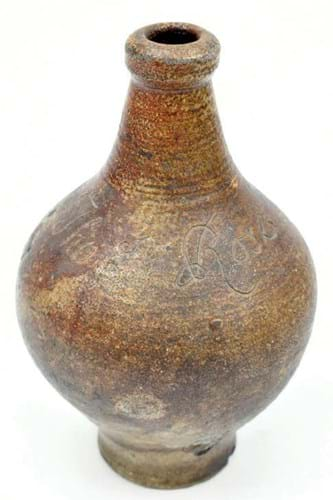Rhenish stoneware Bellarmine or Bartmann jugs (from the German ‘bearded man’) were sold in numerous sizes, had a multitude of uses, including storage of food or drink, decanting wine and transporting goods, and have since been found in the archaeological record over much of the globe.
However, a much scarcer class of 17th and early-18th century stonewares are those produced at John Dwight’s Fulham Pottery on the outskirts of Stuart London.
Although immigrant Dutch or German potters were probably actively making pots much earlier in the century, Dwight (c.1633- 1703), the son of Gloucestershire farmers, is the first clearly documented maker of stoneware in England.
Supported by two greats of Enlightenment science, Robert Boyle and Robert Hooke, he was granted a patent in 1672 for ‘the mistery of transparent earthenware, commonly known by the names of porcelain or china, and of stoneware, vulgarly called Cologne ware’.
This 9in (22cm) pot-bellied ale bottle, a type often found alongside late-17th century British shipwrecks, is probably English – a hypothesis supported by the incised name Thos Rose. The latter adds hugely to its commercial value as does the relatively good condition.
Estimated to sell for £150-250 at Adam Partridge in Macclesfield on May 26, it found a buyer at £3600 (plus 20% buyer's premium).















